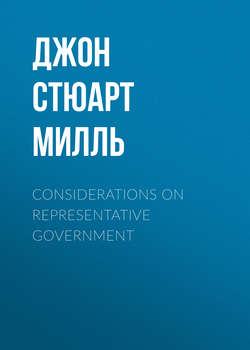Considerations on Representative Government

Реклама. ООО «ЛитРес», ИНН: 7719571260.
Оглавление
Джон Стюарт Милль. Considerations on Representative Government
Preface
Chapter I – To What Extent Forms of Government are a Matter of Choice
Chapter II – The Criterion of a Good Form of Government
Chapter III – That the ideally best Form of Government is Representative Government
Chapter IV – Under what Social Conditions Representative Government is Inapplicable
Chapter V – Of the Proper Functions of Representative Bodies
Chapter VI – Of the Infirmities and Dangers to which Representative Government is Liable
Chapter VII – Of True and False Democracy; Representation of All, and Representation of the Majority only
Chapter VIII – Of the Extension of the Suffrage
Chapter IX – Should there be Two Stages of Election?
Chapter X – Of the Mode of Voting
Chapter XI – Of the Duration of Parliaments
Chapter XII – Ought Pledges to be Required from Members of Parliament?
Chapter XIII – Of a Second Chamber
Chapter XIV – Of the Executive in a Representative Government
Chapter XV – Of Local Representative Bodies
Chapter XVI – Of Nationality, as connected with Representative Government
Chapter XVII – Of Federal Representative Governments
Chapter XVIII – Of the Government of Dependencies by a Free State
Отрывок из книги
All speculations concerning forms of government bear the impress, more or less exclusive, of two conflicting theories respecting political institutions; or, to speak more properly, conflicting conceptions of what political institutions are.
By some minds, government is conceived as strictly a practical art, giving rise to no questions but those of means and an end. Forms of government are assimilated to any other expedients for the attainment of human objects. They are regarded as wholly an affair of invention and contrivance. Being made by man, it is assumed that man has the choice either to make them or not, and how or on what pattern they shall be made. Government, according to this conception, is a problem, to be worked like any other question of business. The first step is to define the purposes which governments are required to promote. The next, is to inquire what form of government is best fitted to fulfill those purposes. Having satisfied ourselves on these two points, and ascertained the form of government which combines the greatest amount of good with the least of evil, what further remains is to obtain the concurrence of our countrymen, or those for whom the institutions are intended, in the opinion which we have privately arrived at. To find the best form of government; to persuade others that it is the best; and, having done so, to stir them up to insist on having it, is the order of ideas in the minds of those who adopt this view of political philosophy. They look upon a constitution in the same light (difference of scale being allowed for) as they would upon a steam plow, or a threshing machine.
.....
Since the distinction most commonly adopted for the classification of social exigencies does not possess the properties needful for that use, we have to seek for some other leading distinction better adapted to the purpose. Such a distinction would seem to be indicated by the considerations to which I now proceed.
If we ask ourselves on what causes and conditions good government in all its senses, from the humblest to the most exalted, depends, we find that the principal of them, the one which transcends all others, is the qualities of the human beings composing the society over which the government is exercised.
.....